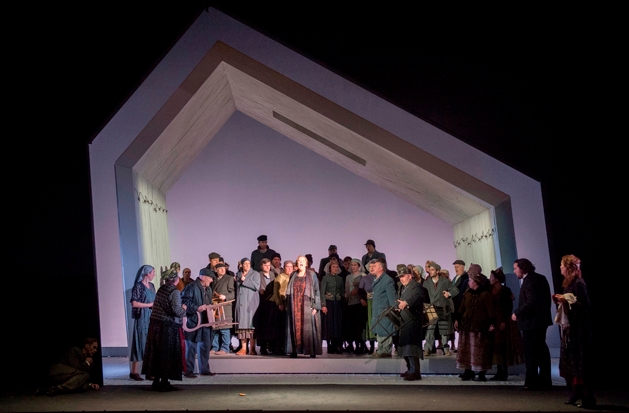About 15 minutes into act one of Jenufa, the student in the next seat leaned over to her companions and whispered, ‘They’re singing in English!’ And so they were, in Otakar Kraus and Edward Downes’s translation. Janacek was obsessed with the shapes and intonations of speech; for a non-Czech speaker, a first-rate singing translation is really the only way to make Jenufa strike home with anything like the immediacy and realism he intended. But even with surtitles, the effort is useless if — as was the case throughout much of act one of this performance by Opera North — the singers are almost inaudible.
It might have sounded clearer in the circle. From the front stalls, however, the situation was impossible. There was no shortage of glory from the orchestra: big surges of string tone, lacerating violin and viola solos and a brass section whose lips must have been close to bleeding by the end. Magnificent, but it’s not opera. How much of the problem was down to Aleksandar Markovic’s supercharged conducting, and how much to director/designer Tom Cairns’s tilted set, was hard to say — the noticeable improvement in acts two and three suggested the latter.
What emerged in those acts, though, was as harrowing a Jenufa as its composer could have wished. Well, we call it Jenufa; Janacek called it Jeji pastorkyna, usually translated as Her Stepdaughter. Once again, as Jenufa’s stepmother the Kostelnicka, Susan Bickley proved how much is lost in that particular translation. From her first Valkyrie-like intervention to the broken woman, hunched and seemingly almost paralysed with guilt, of act three, Bickley lives this role with uncompromising emotional honesty, her steel-plated pride allowing only glimpses of tenderness. ‘Shame and dishonour!’ sings the Kostelnicka as she begins to realise that she can save Jenufa at the cost of her own soul. After an act and a half of snarl and bluster, Bickley let her tone soften and glow, and the whole drama came piercingly into focus.
David Butt Philip as Laca had a similar moment of transcendence shortly afterwards, his voice opening out radiantly to match his character’s transformation from clenched resentment to a just-about-passable partner for Ylva Kihlberg’s fragile Jenufa. Kihlberg’s face was expressive. As the villagers bitched about her wedding dress, or she wrestled with excuses for Daniel Norman’s pale, sweaty Steva, emotions flickered across her eyes before being pushed back into place.
All of this happens inside bright semi-abstract sets dating from the production’s debut in 1995. Combined with Wolfgang Göbbel’s lighting they do an effective job of highlighting the outlines of the drama amid Janacek’s swirling emotional ambiguities. Characters step from pools of light into darkness to confront their thoughts, and the village mob slides backwards as they turn against Jenufa and her stepmother, literally distancing themselves. This still has the potential to be a devastating production of Jenufa, if you could actually hear it.
Glyndebourne’s touring production of Die Entführung aus dem Serail is pretty much trouble-free. Adapted with (apparently) minor changes from this summer’s performances in Sussex, everything about David McVicar’s production is beautiful to look at, from Vicki Mortimer’s sun-kissed period sets to the panther-like physicality and glistening six-pack of Franck Saurel: Pasha Selim as Ross Poldark. Birds trill in the palace gardens and the russets and ochres make each scene look like a watercolour by some 18th-century gentleman orientalist.
Telling details abound: the Pasha’s perfectly behaved children, the knowing glances from his silent and veiled non-European wives, and Ben Bliss’s endless supply of elegant postures as Belmonte. McVicar and revival director Ian Rutherford see to it that each chorus becomes a neatly posed tableau. When the Adagio of Mozart’s Gran Partita drifts from offstage under the spoken dialogue — this is a Pasha whose westernised tastes extend beyond the bedroom — its opening oboe solo perfectly foreshadows the oboe that begins Konstanze’s first aria. It’s exquisite.
And that’s the problem. It’s not that there wasn’t any comic energy: as Blonde, Rebecca Nelsen fizzed even more convincingly with Clive Bayley (Osmin) than with James Kryshak’s milksop Pedrillo, pealing off her coloratura with acrobatic clarity and grace. There was menace too: Ana Maria Labin’s Konstanze was clearly rather more tempted than usual by Saurel’s charismatic Pasha, giving her ‘Martern aller Arten’ a spice of genuine danger. Geoffrey Paterson conducted the vibrato-less modern instrument orchestra with warmth and style.
By then, though, the mood had already been established: tasteful, languid and — with the spoken dialogue broken by long, pensive silences — fatally slow. Mozart’s cheerfully inauthentic Turkish percussion should be the clue: Die Entführung is a comic fantasy. Its characters are just the right side of being cartoons and it’s built for speed. And as Osmin’s bluster about decapitating infidels uncomfortably reminds you, it simply won’t bear too much reality. McVicar has killed it with kindness.






Comments